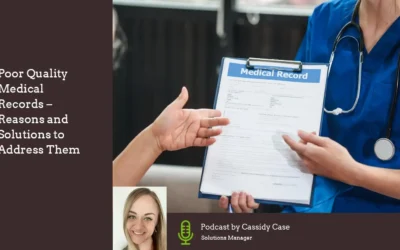Managed Outsource Solutions (MOS) has years of experience providing systematic and timely HIPAA-compliant medical case history and summary services for the medico-legal industry. We ensure stringent quality control protocols, security, customizable turnaround time, and competitive pricing.
In today’s podcast, Jessica Schwartz, one of our Solutions Managers, discusses Medical Records Summary – Dos and Don’ts.
Podcast Highlights
00:14 Why do Attorneys Require Medical Record Summaries?
01:00 What does a Medical Summary Contain?
02:01 Medical Records Summary – Dos and Don’ts
Read Transcript
00:14 Why do Attorneys Require Medical Record Summaries?
Attorneys require medical record summaries to dealing with medico-legal cases related to personal injury, product liability, medical malpractice/negligence, and more. Records summarization allows attorneys to extract the plaintiff’s relevant medical information. Preparing a flawless medical record summary for attorneys requires years of experience and minute attention to detail. Medical records summarization is a process that simplifies the tedious task of arranging medical records. Professional medical record review companies have a team of skilled, registered legal consultants and medical record reviewers that can ensure flawless summary preparation.
01:00 What does a Medical Summary Contain?
A medical summary should reflect the treatment and care received by the patient. It should also elaborately describe the present medical condition of the plaintiff. While summarizing medical records, reviewers must ensure that the medical records are complete, correct, and convenient. They have to collect all the required medical records prior to writing summaries. It is also important that the summary includes all the health practitioners involved in the treatment of the plaintiff. In a personal injury case, the medical summary should contain the particulars of the medical practitioners who gave immediate care in the ER. Attorneys are required to do a thorough medical chart review prior to the summarization of medical records. Outsourcing the process of medical record review can save time and effort for attorneys. Experts can deliver accurate medical case summaries that provide a clear understanding of the case.
Check out the infographic below on our website
02:01 Medical Records Summary – Dos and Don’ts
Dos
- Highlight the most recent information
- Add details of the medication administered
- Focus on clinically relevant information
- Record the rationale for clinical decisions
- Mention clinically-related correspondence
- Reviewing to identify conflicting data
Don’ts
- Avoid discriminatory remarks
- Include socio-economic details if necessary
- Never write self-serving statements
- Never alter a patient’s medical record
- Avoid including non-patient care information
- Avoid using shorthand or abbreviations
Thank you very much for listening and we hope you have a good rest of your day.



